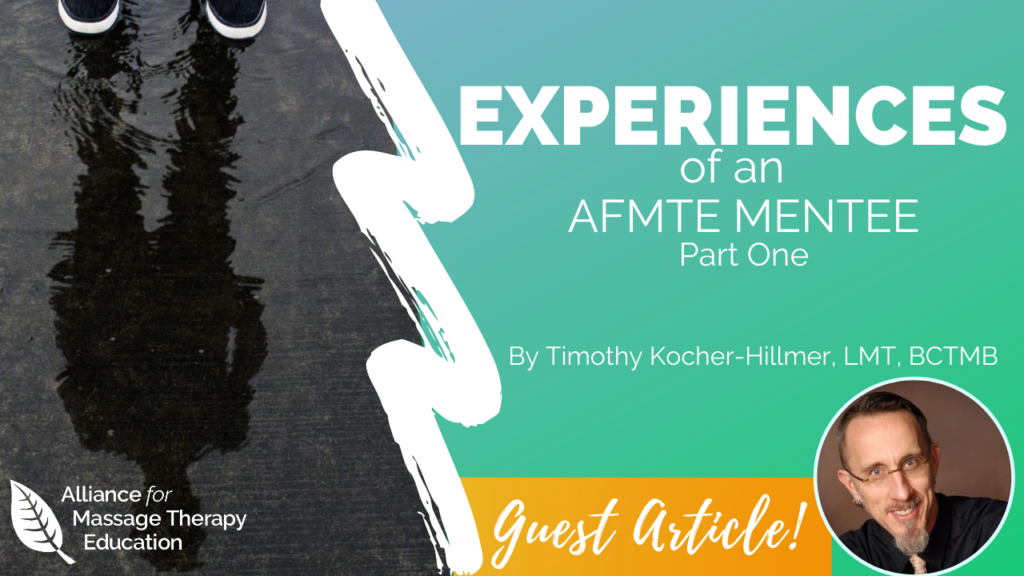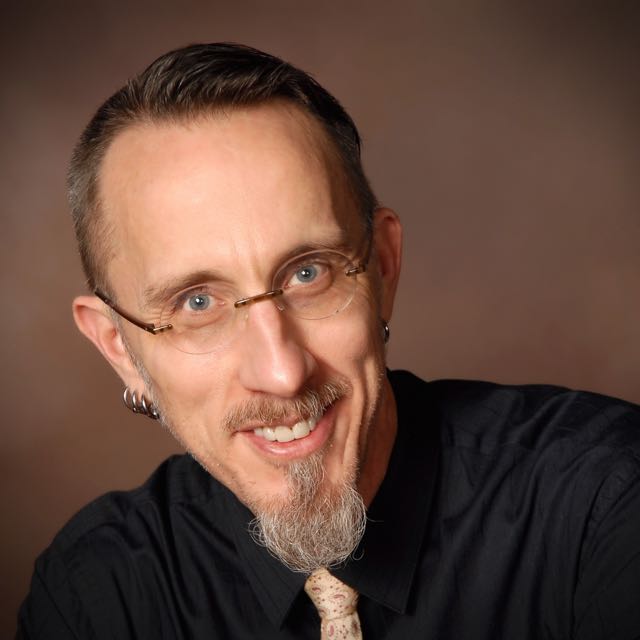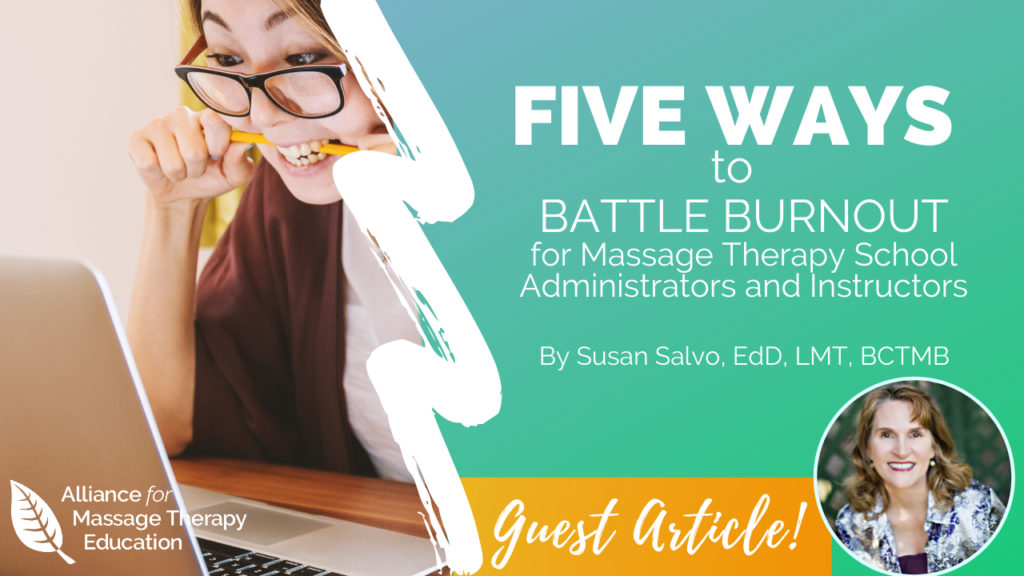
This summer, amidst everything else going on in the world, the Alliance for Massage Therapy Education launched a new mentoring program. This 10-week program matched individuals seeking mentorship with mentors from the field of massage education. Participants in this inaugural program met weekly for 8 weeks from June through August 2020 as mentor-mentee pairs bringing together unique skills and challenges to a relationship of learning and sharing.
In this 3-Part Series, you can follow along as one participant shares their process of discovery in the form of a weekly reflection.
Part 1: Ready? Set. Getting to KNOW you . . . Let the Reflections Begin!
Application for AFMTE Inaugural Mentorship Program —“Prelude”
Sunday, May 17. Don’t know how it happened! Was just sitting here, as they say, minding my own business. Closing up the AFMTE Sunday afternoon support meeting, they announced the application deadline was at midnight that night. Somewhere I’d heard about some mentorship program they were piloting. There was enough on my plate. I had tossed it aside.
Later that evening, I’m not sure what happened. Maybe I wasn’t thinking clearly. Maybe I wasn’t thinking at all! I’m not kidding; something overtook me, and there I was filling in blanks and answering questions . . .
My motivation for applying to this program?
As a 20 year teacher and practitioner with no formal education in teaching, I’ve realized there is much I intuitively bring to the classroom, and I know I have much to learn, as well. Students continue to comment that something I do in class has made an impact on their lives. Without losing that, I’d like to help myself grow in my skills and confidence.
My professional goals?
As a Queer elder with a broad background and approach, I am passionate about supporting Queer youth, People of Color and future LGBTQIA therapists, expanding a profession that I see as still pretty exclusively white and privileged. I’d like to help create more systemic ways for volunteerism to be not only more prevalent, but encouraged and perhaps even required in standard curriculum. Inherent systemic “-isms” of all kinds continue to act upon our profession. I also know that I lack skills in research, both applying it individually but also teaching it in the classroom that is accessible and practical.
Goals I hope to achieve in a mentoring relationship?
Often, I use words as a shield. So, this will be brief. I know I have much to learn. I also have much to offer. I’d like to find more ways to let my instructing make an impact on the future of this profession. . . . I’d like to be more fully engaged and self aware as I take part in this potentially profession—and life-changing adventure.
After an apology for the outdated CV, I confessed that I’d just been reminded about the deadline that day. I closed with this . . .
I trust that if the time is not right for me to take part because of this, some future opportunity will present itself. One final quote which may shed light. Richard Rogers wrote this for “The King & I” but it humbles me in its profundity.
“It’s a very ancient saying, but a true and honest thought, that if you become a teacher, by your pupils you’ll be taught.” I’m at my best when I embody this in the classroom.
But before I knew it, the clock on my Mac said 8:18pm, and I’d completed the application questions, attached a very dated CV and clicked on the “submit” button.
Saturday, May 23. Really?! Reading the email welcoming me “into the inaugural program,” I smiled. Then I laughed out loud when I saw the name of my mentor: Susan Salvo! I couldn’t stop laughing as I wondered what I’d stumbled into. This went on for a while. Then I stopped to breathe. I read the email again. No, I’d read correctly. And again, laughter. Not just snickering, full our belly laughs. Susan Salvo? She literally wrote the book I use in the classroom! How could this have happened? I’m just a guy who stumbled into teaching massage twenty years ago. What will she think of me? I’d been in a CE class on pathology Susan taught at a conference. She is all about terminology, pathology, research. We are from two totally different worlds! This is crazy. I can’t believe it. The laughter stopped. And started. Several times. What a mismatched pair! Wait till I tell them at school. Oh wait, we’re in lockdown. Well, at least I can tell the faculty advisory council at our Zoom meeting on Monday.
Monday, May 25. Today was the killing of George Floyd. I don’t recall talking about the mentor program today.
“The heart sleeps until it is awakened to life by a blow. It is as a rock, and the hidden fire flashes out when struck by another rock.”
— Vilayat Inayat Khan
Mentorship Launch Meeting — “Introductions”
Friday, June 12: A haze of smiling faces. People introducing themselves. Basically, that initial meeting is a blur to me. Like the last several weeks. I’m sure I said something about being passionate about teaching and diversity. That’s all I can recall. Oh, and that Susan messaged me during the meeting. “We season each other.” Cool! But what does she mean?
As the meeting closes, I’m reminded that most of the smiling faces I’ve met with online recently have been all white. This group, the faculty advisory council at school. No judgment here, just an observation. Note to self: Diversity happens at many levels. But don’t become complacent. Keep your eyes and heart open.
Within minutes of the end of the meeting, Susan had sent email asking if I’m okay with homework. “I hope you are open to assignments/activities related to your topics of interest, one of which is to keep a reflection log.”
“Sure!” I say. I’ll send her copy of my newly revised CV, I think. I’ve been keeping myself busy in these weeks. I’d already been reflecting on what this process might bring. But with images of demonstrations and the awakening to systemic racism running in the background, the view keeps shifting.
Somehow especially on this afternoon, everything else feels like it’s occurring in the background. School, my massage practice, the pandemic, cooking meals . . . life feels re-focused, re-framed. Injustice, misuse of power and privilege, and the ways I can’t even see past my own experience are taking center stage.
It’s from this shifting vantage point that I email some initial reflections as a way of introducing myself.
I observe that while I write well, creatively and at times articulately, I do not have a regular writing practice. While technology is in my past, I currently have no blog, social media account, email newsletter mechanism or YouTube channel. In fact, I am proud to have no cell phone. This Luddite-Timothy likes being less connected, but sees the downside of this in the educational arena.
Additionally, I am honest with all my students that I am a great skeptic. I push back at egos of teachers who project their importance. I am curious about the motivation behind the MT industry to “prove” itself with research data. I quote John Barnes who says:
“If a therapist knows what they’re doing when they go into a session, they don’t know what they’re doing.”
In the midst of this I also know that I think about things differently than the “mainstream” massage community. And this, of course, can keep me in chains of doubt. But something also keeps moving through me, encouraging me to be honest and transparent. To keep listening to others, especially those at the margins.
I add that maybe my biggest issue is courage (or lack thereof). While it may appear on the outside that I am clear, confident and articulate, inside I know how little I “know.” Not sure what to do with this other than to acknowledge that this trait (I believe) makes me a compassionate and “safe” therapist and instructor.
However, “knowing” that we’re supposed to focus on a project, I suggest one of the following:
- Building lessons for evidence-informed practice
- Fostering cultural competence
I close by asking about her phrase: You chatted that we “season each other.” This speaks to me. Tell me more.
Within a few hours, Susan replies to my email queries:
Focus/Intention/Project: How about two projects? One on building lessons for evidence-informed practice (which includes research literacy) and one on cultural competence (which includes empathy). Once you look at my CV, you can always change this based on content I’ve presented in the past. I’m quite flexible and easy to work with.
Season: I had the most amazing and diverse cohort in graduate school. This was our mantra as it states the transformative process is reciprocal.
I’m reminded of the on-line ethics class I taught the week after George Floyd’s killing. Thankfully not ALL my zoom meetings have been white only. I’m grateful for my students who keep me grounded in this world. At the time it seemed necessary and appropriate to directly talk about racism as we opened up a class called “Professional Ethics 1.” In hindsight, I’m affirmed by Susan’s words that the transformative process is reciprocal. And by a model of being flexible and easy to work with.
Without knowing where this process will lead, I trust that it will be a tremendous journey.
Mentor Session — Week One: “Competency”
Wednesday, June 17. Hmmm . . . this may not be so bad after all. Susan is a story teller, like Dad was. Meeting with Susan individually felt very natural. More comfortable than I’d expected.
She’s also a word person. Just like me, but maybe more so! I look things up in Dad’s 1946 three-volume Webster’s. She uses www.etymonline.com, the online etymology dictionary. I really like to get to the roots of words. They help me understand. Note to Self: Remember, I can get lost in down the rabbit hole.
Reflection #1: Conduct a self-assessment on how you feel you are in the context of embracing multicultural education. Do you feel this is a teacher competency? Why or why not?
Reflecting on this question, I’m drawn to the word competency. I feel a push and pull feeling. Being merely competent? Pfft! Forget that, but I do want to be validated for my skill. And I wonder about my resistance, as well, as my need to be affirmed. So I check Volume One of Dad’s Webster’s and see that the word has roots in both French and Latin competere: to strive after together, to be qualified . . . . That feels better. I really don’t like the idea of being just good enough.
But the etymology takes me deeper.
[See Compete] Hmmm . . . don’t like that word much. Never have admitted to being competitive. Hated sports because of that competitive thing. And in all that’s going on in the country and world now, competition isn’t the best use of our collective energy.
But I stay with it. Compete: 1. to contend emulously. Emulous: 1. ambitious to equal another. Well, that helps me embrace this idea of competency more fully. And the racial divide we need to repair. If we could shift global thinking from getting ahead, instead to see how we must “equal” each other. Yes! Now, where was I? Oh, competency.
Honestly? Words like accreditation, competencies, rubrics. Meh. Don’t like ‘em much. Too wordy. Too heady. Too focused on book learning. Does this make me a bad instructor? But honestly, it brings up performance anxiety. Makes me sweat. But I get it. An academic standard is needed. But what about a “standard of Heart?” I can support institutions that are striving after something as long as there is a balance between the two. And a room for deeper examination of what is really important.
So, do I feel embracing multicultural awareness needs to be a competency? Well, yeah! For teachers AND for students AND all practitioners of bodywork. How about for anyone who walks in the world?! Not only do I feel it needs to be on the list, I believe it should be right at the friggin’ top! If educators consider themselves qualified to “teach” another person, they need to be able to acknowledge that their own personal beliefs and opinions are only one part of a vast world of experience. We need to be aware of how we are limited by our own individual “presets.” We need to have courage to expand our vision to see outside the boxes of our comfort level. And to humbly notice our resistance to see our part in the insidiously designed system of oppression and we’re born into.
But back to the question: how you feel you are in the context of embracing multicultural education. How do I feel? Well, obviously I’m angry at the state of the world. But more so, I feel lacking. I can be passionate about the importance of this for students in massage school, for my instructor colleagues . . . . but I’m not feeling like there’s a set bunch of bullet points we can list that makes someone competent in this arena. That’s why I’m here: to find out more. To find ways and then be able to share them with others.
So, I’ll choose the first part of the definition from the Latin: to strive together. This reminds me what we’re about here is a verb not a noun. We are striving, in process, (hopefully) moving forward and toward deeper Knowledge. According to Webster, we’re doing it together. And I can even live into the related root word “compete”, if that means we’re contending emulously, that we are “ambitious to equal another.” We are in this together, not to claim we’re better than another, but to look at the world with eyes that see equality is something we do. Like being “seasoned” by each other, we can also “equal” each other. We can learn to see that our diversity actually leads us into our Ultimate Unity.
Ohmygosh, what time is it? I need to make lunch for my husband.
Did You Enjoy this Feature?
Check back next week for Part 2 of 3 in this series where Timothy explores how—against the backdrop of current events, issues and challenges—teachers and students are drawn to consciously examine how words power actions.
About the Author

Timothy Kocher-Hillmer, LMT, BCTMB
With life-long experience in music and liturgy, Timothy studied voice and musical composition in college and earned his B.S. in Commerce from DePaul University. He is a graduate of the Pittsburgh School of Massage Therapy, is licensed in Pennsylvania and has been in private practice since 2000. His work with clients focuses on myofascial pain syndrome relief, trauma recovery and emotional balancing.
As a massage educator at the Pittsburgh School of Massage Therapy since 2001, Timothy encourages massage therapists and students to pay exquisite attention to the energetics of personal intention and body mechanics. He lives with his husband of 32 years on Happy Hill in Pittsburgh where they practice taking the long way home.
For another feature by an AFMTE Member, check out 5 Ways to Battle Burnout by Timothy’s Mentor, Susan Salvo


2 Responses
What a stimulating , and yet sweet, read! Thank you for sharing, Timothy. It makes me feel sorry I didn’t sign for this mentoring program. How do you qualify , where is it offered?
Hello, the mentor program Timothy participated in is a pilot program. We are currently preparing a group mentorship program and hope to announce this and how to apply soon. We hope to offer both on a regular basis in the future. As a member you will receive and announcement in your email. Thank you, Teacher Education Resources Committee